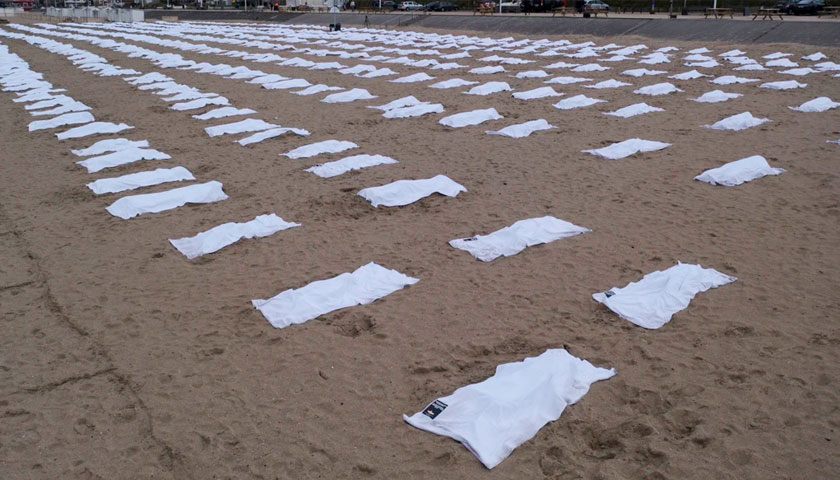A shocking sight on the beach at Zeebrugge: locals and day-trippers faced hundreds of human-sized sand sculptures of babies, children and adults – all shrouded in white. Beachgoers’ favourite sandy spot resembled a mass grave of bodies washed ashore. The sheets covering them were adorned with an unequivocal message: “Searching for a place for your towel? 621 people drowned searching for a place to live.”
The 621 sculptures represent the migrants who perished in the Mediterranean Sea during the first trimester of 2021. According to the most recent figures from the International Organization for Migration (IOM), the number has since risen to 827. It marks a dramatic increase from 2020, when 375 people drowned trying to survive the crossing to the European mainland.
In part due to the conflict in Gaza, the retreat from Afghanistan by the United States’ and North Atlantic Treaty Organization (NATO), and the global instability caused by the coronavirus crisis, record numbers of people are fleeing their homes.
“We want Belgian politicians and the European Union to wake up and realise their approach isn’t working. The right to seek asylum is the cornerstone of every asylum and migration policy. But with its lack of legal ways to enter Europe, heavily guarded external borders and obstacles to being granted asylum, the current policy is all about trying to keep people out. It’s an inhumane solution that forces people into the clutches of people smugglers. With today’s protest, we hope to shock the world into action by making the human cost of this failing migration policy painfully visible.”
– Charlotte Vandycke, Spokesperson for Flemish Refugee Action
Belgium needs to take the lead
Flemish Refugee Action points to the fact that many migrants are unable to meet the strict requirements for obtaining a visa or for being granted family reunification. For the majority of them, rickety boats and people smugglers are a last resort to try and reach Europe. As a result, the Mediterranean Sea claims hundreds of lives each year. Those who do survive the crossing often find their journey cut short and end up in refugee camps.
“What we need is more safe and legal ways for people who need protection to enter Europe. That requires a coherent and transparent policy on humanitarian visas, a structural resettlement policy with high annual quotas, and a relaxation of family reunification criteria and procedures. The Belgian government should take the lead in making that happen, increase quotas and devise a multi-year programme that matches the actual needs of people fleeing their countries.” – Charlotte Vandycke
Flemish Refugee Action wants Belgium to turn its human rights promises into action. The organisation has two practical suggestions on how to get started. Together with the 11.11.11 coalition of NGOs, it has calculated a way for the country to implement a more ambitiousstructural resettlement policy, which would see the number of planned refugee resettlements increase from this year’s 1,615 to 3,000.
The organisation also urges the Belgian government to lobby other European countries to resume joint rescue operations on the Mediterranean Sea. It wants Belgium to insist that the European Border and Coast Guard Agency, Frontex, respect the International Convention for the Safety of Life at Sea (SOLAS). In its coalition agreement, the Belgian government has promised to do just that. Time to turn words into deeds, the shrouded silence on the beach this morning seemed to say.
